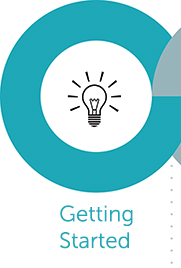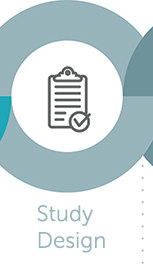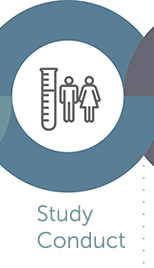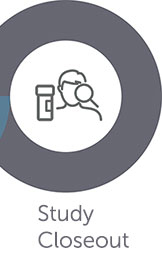Study Design | Overview
Consult with experts
| Biostatistics and Research Design (BARD) | The biostatistician helps you with: Designing your experiment and/or survey, developing the measurement plan, relating the analyses to your objectives, planning and/or conducting analysis, and interpreting your analysis. It is important to involve the biostatistician early in the planning of your study. Some Divisions/Departments have a dedicated statistician. Check with your Division/Department leadership. If you won't be working with a departmental statistician, you can submit an online request for a consult.” |
| Scientific Medical Writer | If you could use the assistance of a scientific medical writer for a grant application or for developing your study protocol, the ICCTR has access to one. To discuss the details of this service as well as pricing please contact Cindy Williams, DNP, RN, PNP, NE-BC, co-director, ICCTR Clinical Research Operations Center; nursing director, ETU. |
Develop protocol
| Protocol guideline | A clinical research protocol is the embodiment of a clinical research plan and expresses its scientific agenda, clinical relevance, organizational thoroughness and professional quality. A well-written study protocol should be clear and comprehensible to the variety of audiences that it addresses, including medical, statistical and human-subject reviewers, as well as the co-investigators and staff who are ultimately charged with carrying out the research. View the ICCTR Research Practice Guidelines, "How to Write a Study Protocol."  |
| NIH research guidance | |
| Phase 2 and 3 IND/IDE Studies |
Begin database planning
| Clinical Research Informatics Team (CRIT) | Complete the CRIT Intake Request Form to discuss the appropriate database for your clinical research study. |
Navigate regulatory requirements
| Regulatory support | An essential part of conducting research is ensuring your study is compliant with federal, state, local and hospital regulations and policies. Depending on the type of research that you are conducting, different types of regulatory review and approval must be granted before you begin. |
Develop budgets/contracting and seek funding
| Clinical Trials Business Office (CTBO) | The CTBO oversees contract and budget development and negotiation for industry-sponsored clinical trials, investigator-initiated studies, and other sponsored clinical research, regardless of the source of funding. The CTBO manages the business requirements of engaging in clinical research at Boston Children’s, including making insurance coverage determinations, coordinating charges for routine- and research-related care, invoicing sponsors, and ensuring compliance with state and federal billing regulations. |
| Funding opportunities | Get information about funding opportunities. |
Consult Investigational Drug Service pharmacy
| Investigational Drug Service (IDS) pharmacy | If your research study involves the use of a study drug, please seek consultation with Stephen Chu, R.Ph., Investigational Pharmacist. It is ideal to involve the investigational pharmacist early in the process of designing a research study that involves the use of an investigational agent. The IDS pharmacy offers comprehensive investigational drug services including inventory management, drug accountability, dispensing, assistance with research protocol development, blinding, and drug formulation. |
Chart review
| Chart review methodology | There is a wealth of clinically relevant data available in historical medical records. Learn about the methodology of a well-conducted chart review. Download a template for a Data Management Plan for a Retrospective Chart Review. |
Additional study planning resources
| TransLab | The TransLab is a core laboratory that can support specific clinical trial needs on a charge-back or grant-funded basis. It is flexible and adaptable, and provided a variety of services from full translational development of custom assay for the support of clinical trials to isolation of specific biological monitoring of patient samples. The work performed in the TransLab is both quality monitored and regulatory compliant, and properly documented. It utilizes close collaboration and interaction with the clinical investigators, as well as other core facilities. |
| BioBank | The Biobank Core Lab was created to serve as a core resource that would ensure top-level specimen handling and services to the Boston Children's Hospital research community, supporting all departments, divisions, and programs. It serves as both a service core and a biorepository, providing an institutional perspective on the presence of specimens that may be available for use to foster collaborations and accelerate research and discovery. |






